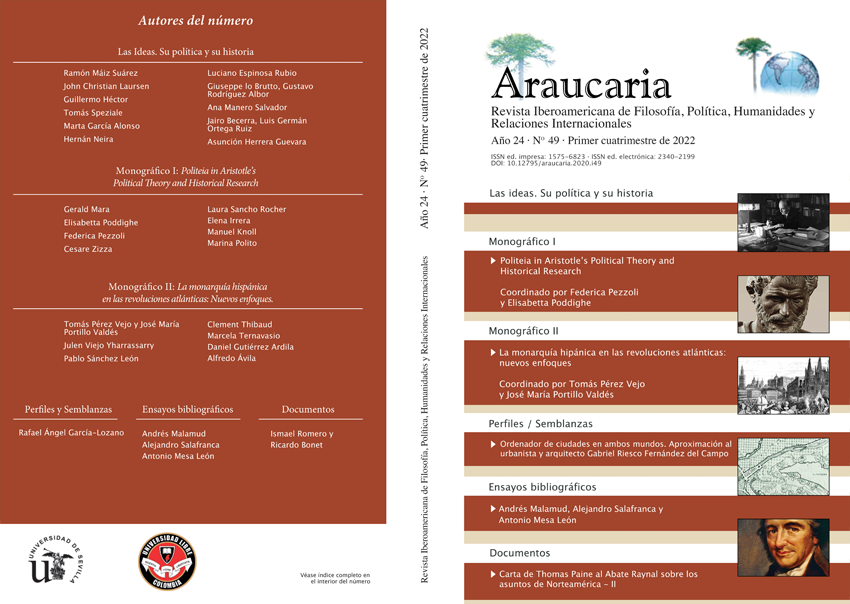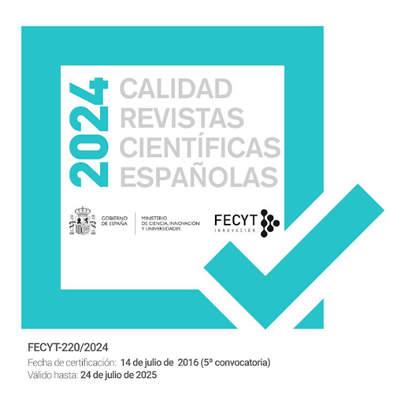Politeia and the historical account of the polis in Aristotle
DOI:
https://doi.org/10.12795.14Parole chiave:
politeia’s intelligibility, polis’ history, political justice, Aristotle on the unity of the polis, Cleisthenes’ reform, Aristotle on history and poetryAbstract
Aristotle’s conception of the politeia (regime, constitution) as a distinctive feature of the historical experience of the polis is a key aspect in his treatment of politics. Part of this discussion deals with Aristotle’s attempt to locate and define the qualities of the politeia as the most valid criteria for a historical account of the polis. These are the qualities I intend to address in this chapter. In section 1 I consider the role of the politeia in Aristotle’s account of the history of the polis after it deviates from the monarchic model of government. In section 2 I tackle the problem of the politeia’s intelligibility inside the polis understood as a “community of interpretation”. Finally, in section 3 I address the politeia as an expression of the unity of the polis and discuss its quality to unify actions (praxeis) aimed at a common goal. Here I argue that it is the politeia’s “unifying quality” that highlights the causal connections underlying actions that regard the polis. Within the context of the politeia, the historical account of the polis connects actions which outside the framework of the politeia do not appear to be so closely related.
Downloads
Metriche
Riferimenti bibliografici
Accattino 1978: P. Accattino, Il problema di un metodo biologico nella Politica di Aristotele, in Atti dell’Accademia delle Scienze di Torino, Classe di Scienze Morali, Storiche e Filologiche, 112, 1-2, 1978, 169-195.
Accattino 2013: P. Accattino, Aristotele. La Politica. Commento al libro III, in P. Accattino-M. Curnis (eds.), Aristotele. La Politica. Volume III (libro III), Roma, 2013, 147-239.
Armstrong 1998: J.M. Armstrong, Aristotle on the philosophical nature of poetry, in CQ 48, 1998, 447-455.
Atack 2014: C. Atack, The Discourse of Kingship in Classical Athenian Thought, in Histos 8, 2014, 329-362.
Atack 2015: C. Atack, Aristotle’s Pambasileia and the Metaphysics of Monarchy, in Polis 32, 2015, 297-320.
Atack 2019: C. Atack, The discourse of kingship in Classical Greece, London-New York.
Bertelli 2011: L. Bertelli, La giustizia politica in Aristotele, in A. Balbo-F. Bessone-E. Malaspina (eds.), “Tanti affetti in tal momento”. Studi in onore di Giovanna Garbarino, Alessandria, 2011, 65-77.
Bertelli 2017: L. Bertelli, Scienza della politica e politeia in Aristotele, in PP 72, 2017, 75-97.
Besso-Curnis 2011: G. Besso-M. Curnis (a cura di), Aristotele. La Politica. Libro I, Roma, 2011.
Bobzien 2014: S. Bobzien, Choice and moral responsibility in Nicomachean Ethics III 1-5, in R. Polansky (ed.), The Cambridge companion to Aristotle’s Nicomachean ethics, Cambridge, 2014, 81-109.
Cairns-Canevaro-Mantzourani 2020: D. Cairns-M. Canevaro-K. Mantzouranis, Aristotle on the causes of civil strife: subjective dispositions, proportional justice and the occasions of stasis, in Maia 72, 2020, 551-570.
Cammack 2013: D. Cammack, Aristotle’s Denial of Deliberation about Ends, in Polis 30, 2013, 228-250.
Carli 2011: S. Carli, Aristotle on the Philosophical Elements of Historia, in Review of Metaphysics 65, 2, 2011, 321-349.
Coby 1988: P. Coby, Aristotle’s Three Cities and the Problem of Faction, in The Journal of Politics 50, 1988, 896-919.
Contogiorgis 1978: G.D. Contogiorgis, La théorie des révolutions chez Aristote, Paris, 1978.
Duke 2020: G. Duke, The Aristotelian legislator and political naturalism, in CQ 70, 2020, 620-638.
Fantasia 1975: U. Fantasia, Platone e Aristotele sull’organizzazione della XΩPA, in ASNSP 5, 1975, 1255-1274.
Fouchard 1997: A. Fouchard, Aristocratie et démocratie. Idéologies et sociétés en Grèce ancienne, Besançon, 1997.
Frank 2005: J. Frank, A Democracy of Distinction: Aristotle and the Work of Politics, Chicago, 2005.
Frank 2007: J. Frank, Aristotle on Constitutionalism and the Rule of Law, in Theoretical Inquiries in Law 8, 2007, 37-50.
Frank-Monson 2009: J. Frank-S.S. Monson, Lived excellence in Aristotle’s Constitution of Athens: why the encomium of Theramenes matters, in S. Salkever (ed.), The Cambridge Companion to Ancient Greek Political Thought, Cambridge, 2009, 243-270.
Gastaldi 2012: S. Gastaldi, L’origine della città nella Politica di Aristotele, in F. Calabi-S. Gastaldi (eds.), Immagini delle origini. La nascita della civiltà e della cultura nel pensiero antico, Berlin, 2012, 121-137.
Gray 2015: B. Gray, Stasis and Stability: Exile, the Polis, and Political Thought, c. 404-146 BC, Oxford, 2015,
Keaney 1992: J.J. Keaney, The Composition of Aristotle’s AP. Observation and Explanation, Oxford, 1992.
Keyt 1987: D. Keyt, Three Fundamental Theorems in Aristotle’s “Politics”, in Phronesis 32, 1, 1987, 54-79.
Keyt 2017: D. Keyt, Nature and Justice, Louvain-La-Neuve, 2017.
Keyt forthcoming: D. Keyt, Dealing with Aristotle’s Indefensible Ideas, in D. Keyt-Ch. Shields, Principles and Praxis: Essays in Honor of Fred D. Miller, Jr. (forthcoming).
Knoll 2017: M. Knoll, Aristotle’s Arguments for his Political Anthropology and the Natural Existence of the Polis, in R. Güremen-A. Jaulin (eds.): Aristote, l’animal politique, Paris 2017, 31-57.
Kraut 2002: R. Kraut, Aristotle: Political Philosophy, Oxford, 2002.
Kullmann 1991: W. Kullmann, Man as a Political Animal in Aristotle, in D. Keyt-F.D. Miller, Jr. (eds.), A Companion to Aristotle’s Politics, Cambridge-Oxford, 1991, 94-117.
Leszl 1991: W. Leszl, Alcune specificità del sapere pratico in Aristotele, in A. Alberti (a cura di), Studi sull’Etica di Aristotele, Napoli, 1991, 65-118.
Lewis 2011: J.D. Lewis, Constitution and Fundamental Law: The Lesson of Classical Athens, in Social Philosophy and Policy 28, 2011, 25-49.
Lintott 1992: A. Lintott, Aristotle and Democracy, in CQ 42, 1992, 114-28.
Lintott 2018: A. Lintott, Aristotle’s Political Philosophy in its Historical Context. A New Translation and Commentary of Politics Books 5 and 6, London-New York 2018.
Lisi 2000: F.L. Lisi, The concept of law in Aristotle’s Politics, in J.J. Cleary-G.M. Gurtler (eds.) Proceedings of the Boston Area Colloquium in ancient philosophy, Leiden, 2000, 29-53.
Lisi 2008: F.L. Lisi, The Second Book of Aristotle’s Politics, in Res Publica Litterarum 1, 2008, 2-21.
Lockwood 2017: T.C. Lockwood, Aristotle on the (alleged) Inferiority of History to Poetry, in W. Wians-R. Polansky (eds.), Reading Aristotle: Argument and Exposition, Amsterdam, 2017, 315-333.
Lord 1991: C. Lord, Aristotle’s Anthropology, in C. Lord-D. O’Connor (eds.), Essays on the Foundations of Aristotelian Political Science, Berkeley, 1991, 49-73.
Lord 2013: C. Lord, Aristotle’s Politics, Chicago, 2013.
Lucchetta 2011: G.A. Lucchetta, Aristotele politicamente scorretto: se non le mura, cosa fa di una polis una polis?, in Dianoia 16, 2011, 7-45.
Mara 2002: M.G. Mara, The Culture of Democracy. Aristotle’s Athenaion Politeia as Political Theory, in A. Tessitore (ed.), Aristotle and Modern Politics: The Persistence of Political Philosophy, Notre Dame (IN), 2002, 307-341.
Mayhew 1997: R. Mayhew, Part and Whole in Aristotle’s Political Philosophy, in The Journal of Ethics 1, 4, 1997, 325-340.
Miller 1991: F.D. Miller, Aristotle on Natural Law and Justice, in D. Keyt-F. Miller (eds.), A Companion to Aristotle’s Politics, Cambridge-Oxford, 1991, 279-306.
Miller 2003: F.D. Miller, Aristotle’s Theory of Political Rights, in R.O. Brooks-J.B. Murphy (eds.), Aristotle and Modern Law, Ashgate, 2004, 309-350.
Miller 2005: F.D. Miller, Naturalism, in C. Rowe-M. Schofield (eds.), The Cambridge History of Greek and Roman Political Thought, Cambridge, 2005, 321-365.
Moggi 2012: M. Moggi, Disomogeneità etniche e difficoltà di integrazione come cause di “stasis” (Aristotele, Politica V 3 1303a25-b3), in M. Polito-C. Talamo, Istituzioni e costituzioni in Aristotele tra storiografia e pensiero politico, Tivoli, 2012, 95-109.
Munn 2000: M.H. Munn, The School of History: Athens in the Age of Socrates, Berkeley-London, 2000.
Murray 1993: O. Murray, Polis and Politeia in Aristotle, in M.H. Hansen (ed.), The Ancient Greek City States, Copenhagen, 1993, 197-210.
Natali 1989: C. Natali, La saggezza di Aristotele, Napoli, 1989.
Ober 1993: J. Ober, The Polis as a Society. Aristotle, John Rawls and the Athenian Social Contract, in M.H. Hansen (ed.), The Ancient Greek City States, Copenhagen, 1993, 129-160.
Oliveira 2019: R.R. Oliveira, The Aristotelian theory of regimes and the problem of kingship in Politics III, in Trans/Form/Ação 42, 2019, 31-58.
Poddighe 2010: E. Poddighe, Mescolanza o purezza? Il diapsephismos tra i Pisistratidi e la riforma di Clistene, in Klio 92, 2010, 285-304.
Poddighe 2014: E. Poddighe, Aristotele, Atene e le metamorfosi dell’idea democratica, Roma, 2014.
Poddighe 2016: E. Poddighe, Giustizia e costituzione: scienza politica e intelligibilità della storia secondo Aristotele (EN, V, 1134a 25-1135a 8), in Gerión 34, 2016, 77-101.
Poddighe 2018: Legittimazione del potere e polemica antiplatonica in Aristotele, Politica V. 1316a 39 – b 6. Una nota, in Politica Antica VIII, 2018, 19-24.
Poddighe 2019a: E. Poddighe, Politeia nella storiografia e nel pensiero storico greco tra V e IV secolo a.C.: la questione della continuità e del mutamento, in Gerión 37.2, 2019, 271-300.
Poddighe 2019b: E. Poddighe, Historikon einai e synoran: riflessioni sulla funzione della conoscenza storica nel pensiero aristotelico, in B. Savo (ed.), Specula Historicorum. Trasmissione e tradizione dei testi storiografici nel mondo greco, Roma-Tivoli, 2019, 95-120.
Polito 2017: M. Polito, Gli opuscoli sulla politeia della Scuola di Aristotele, in PP LXXII, 2017, 11-44.
Polansky 1991: R. Polansky, Aristotle on Political Change, in D. Keyt-F.D. Miller (eds.), A Companion to Aristotle’s Politics, Cambridge-Oxford, 1991, 322-345.
Polansky 2014: R. Polansky (ed.), The Cambridge companion to Aristotle’s Nicomachean ethics, Cambridge, 2014.
Preus 2012: A. Preus, Aristotle on Oligarchy: theory and observation, in Philosophical Inquiry 35, 2012, 26-58.
Rogan 2018: E. Rogan, La Stásis dans la Politique d’Aristote, Paris 2018.
##submission.downloads##
Pubblicato
Come citare
Fascicolo
Sezione
Licenza
Las ediciones impresa y electrónica de esta Revista son editadas por el Secretariado de Publicaciones de la Universidad de Sevilla, siendo necesario citar la procedencia en cualquier reproducción parcial o total.Salvo indicación contraria, todos los contenidos de la edición electrónica se distribuyen bajo una licencia de uso y distribución “Creative Commons Atribución-NoComercial-SinDerivar 4.0 Internacional”
- Abstract 665
- PDF (English) 193











